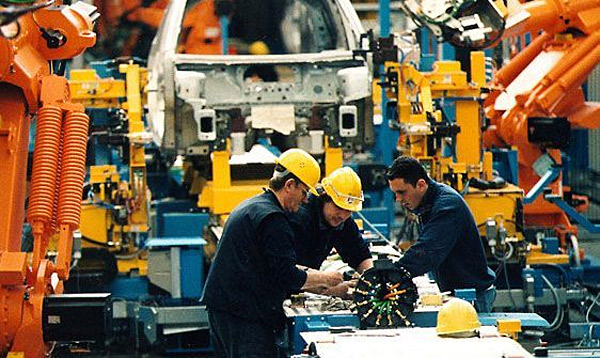
|  |  |  Business News Business News  
Mexico's September Auto Output Hits Record 197,418 Units
 Laurence Iliff - Dow Jones Newswires Laurence Iliff - Dow Jones Newswires
go to original
October 13, 2010


| | Overall production from January to September was 1.66 million, a 67% rise compared to 2009, when the global economic downturn was in full-swing. (RAC) |  |
Mexico City - Mexico's production of cars and light trucks hit a record for a September at 197,418 vehicles last month, as local auto plants sliced out a larger chunk of the U.S. market, where more than one in 10 vehicles now purchased are made south of the border, the Mexican Auto Industry Association, or AMIA, said Tuesday.

Output last month was 35% higher than in the year-ago month, and September also marked the third-highest production level for any month, thanks to greater participation in the U.S. market. Mexican-made cars have nearly 11% of the U.S. automobile market, about double in percentage terms than a year ago, said AMIA President Eduardo Solis Sanchez at a news conference.

Auto exports last month grew 44%, to 169,510 autos - also a record for a September.

In the first three quarters of 2010, U.S. consumers bought 943,336 Mexican-made cars and light trucks, compared with 574,805 from January to September of 2009. "While the cake has gotten smaller, our slice has grown," Solis said, adding that a sustained U.S. economic recovery over three or four years could add half a million units to Mexico's annual auto production.

Overall production from January to September was 1.66 million, a 67% rise compared to 2009, when the global economic downturn was in full-swing. Exports in the period were 1.38 million vehicles - 71% higher than in the like period of last year, AMIA said. In addition to its biggest market in the U.S., Mexico also has significant exports to Canada, Latin American countries and Europe.

Fear of slower economic growth in the U.S. in coming months doesn't have auto makers worried here yet, said Solis, with no plans on the horizon for idling car plants as was done last year. "We have not felt any deceleration in the U.S. market," he said. "What we have to understand is that the U.S. economy is still growing, just not at the same pace."

Solis said German-built autos had also increased their share of the U.S. market from January through September as compared with the first nine months of 2009, but market share for South Korea and Japan slipped.

While local car makers are pleased with Mexico's growth as an export platform, the domestic market remains mostly flat.

Local sales in September rose 13% from the year-ago month, to 65,932 vehicles. From January to September, domestic sales were 6.7% higher, to 565,789 units. Solis said total sales of autos in Mexico are expected to be about 800,000 for the year.

Guillermo Rosales Zarate, head of the Mexican Automobile Dealer's Association, said new car purchases per capita were similar to the level of 30 years ago. In contrast, used cars from the U.S. have been flooding across two key border crossings - Tijuana and Nuevo Laredo - as well as Ciudad Juarez to a lesser extent.

He said it was difficult to tell what impact the elimination of yearly car ownership fees would have on domestic sales, since the federal government's decision to end the annual charge doesn't require states to do the same.

Solis said the government needs to do more to promote the sale of new cars and the disposal of used cars. "Just talking about used cars that have been imported, there are 4.7 million junkers - garbage," he said. In order to get people to scrap their old cars, Mexico should apply modern safety and emissions standards to all cars nationwide, regardless of their age.

"In Mexico, a car owner continues to drive the vehicle until he doesn't want it anymore," said Solis. "And then the person who buys it, takes it back out on the road again," he said.

The auto industry is Mexico's largest single manufacturing sector, and has been a key driver of growth in industrial output this year. Also Tuesday, the National Statistics Institute reported that overall industrial production for August rose 8.1% from a year earlier, beating economists' expectations of a 6% increase.
|

 |
|  |



